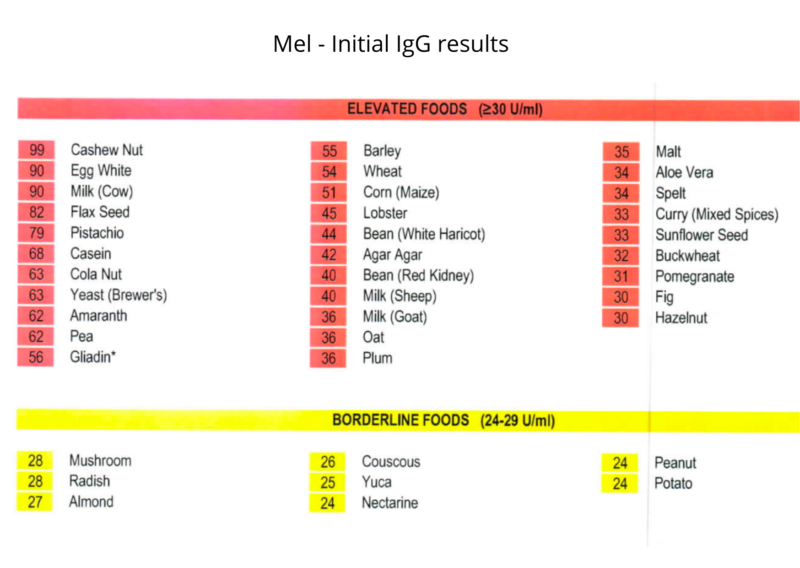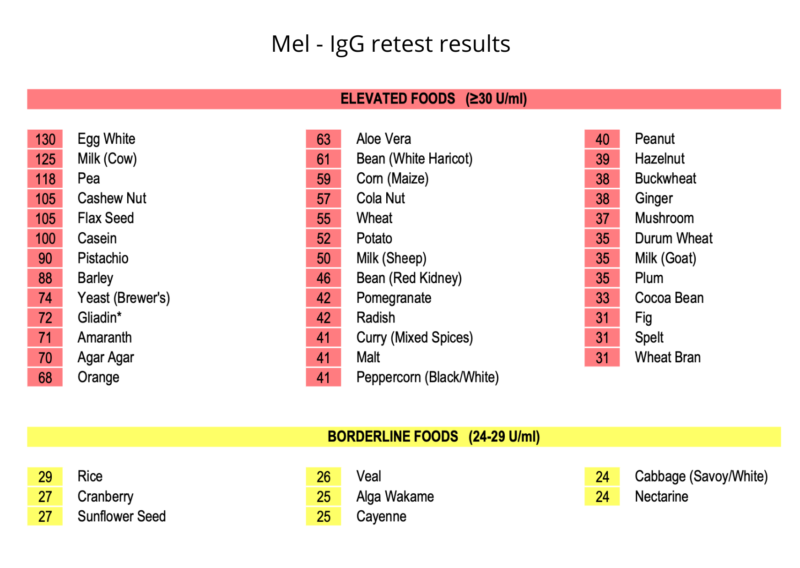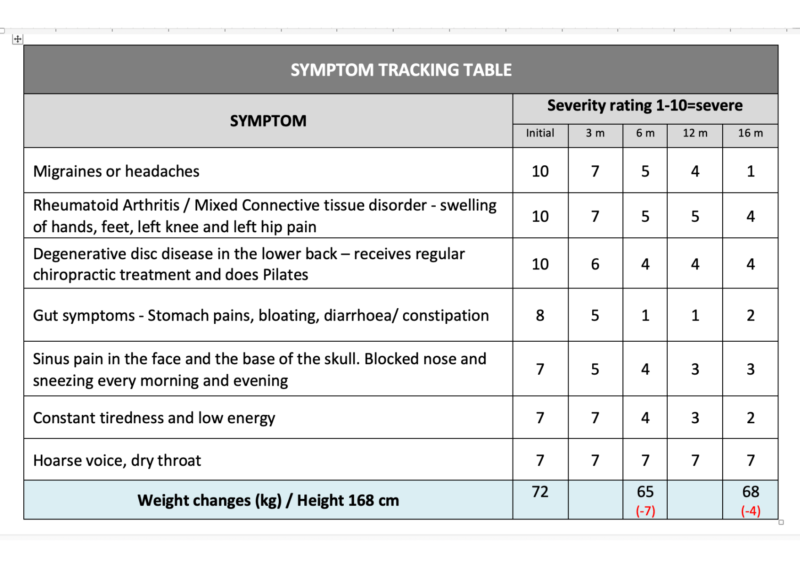Food sensitivities are on the rise in the Western countries globally across all age groups according to health statistic and our local clinical experience. We know that many chronic illnesses are linked to underlying food sensitivities so, food can be either our best friend or the worst enemy.
Growing scientific research demonstrates how specific conditions can be improved by identifying and avoiding foods that trigger an immune reaction leading to inflammation and subsequent detrimental health effects.
Autoimmunity and diet – are they related?
Whether diet may influence autoimmunity has been the subject of many debates and growing evidence indicates there is an overlap between the mechanisms controlling immune tolerance to foods and autoimmunity.
In this post, I discuss a remarkable clinical case of significant improvements in multiple autoimmune conditions characterised by a number of severe symptoms. This was achieved by following a nutrition-based therapeutic method centred on the IgG food sensitivities testing, and following the elimination diet based on the test results.
To better understand many clinical concepts discussed here, please review my comprehensive post on mechanism of action and testing of IgG food intolerances and testing HERE.
Autoimmunity and food sensitivities – a case study
Clinical case presentation
Melissa (Mel), a 46-year-old teacher, had been unwell for many years going from doctor to doctor in search for answers but nothing worked for her. Prior to this she was a fit elite athlete who was selected to play soccer for Australia.
She presented with a number of longstanding health problems, including severe IBS since primary school, accompanied by frequent nausea. She was concerned about the worsening of her symptoms in the past 4 years despite consulting with many doctors and taking a number of medications.
She described her main symptoms as follows:
- Diagnosed with the Mixed Connective Tissue Disease (MCTD) and Rheumatoid Arthritis in 2015 (both are autoimmune diseases) after a long stay in the hospital and being very unwell. These conditions manifested as swelling and pain of hands, feet, left knee and left hip. She had many cortisone injections to help with pain over the years. The feet pain could get so bad she couldn’t walk unless she got another injection.
- Daily migraines and/ or headaches – she was hospitalised with severe uncontrollable migraines at times. She had many migraines one month and then none the next. Sometimes she got ‘just’ a headache that was neutralised with the drug Nurofen.
- Gut imbalances – regular stomach pains (moderate to severe), alternating diarrhoea and severe constipation, gas and bloating. Frequent nausea was particularly debilitating. She also had multiple food reactions and poor digestive function, and “IBS since primary school”.
- Degenerative disc disease in the lower back. During acute episodes she had severe pain. She couldn’t walk or move, it even hurt to breathe deeply. She’d been hospitalised numerous times for this.
- Sinus pain in the face and base of the skull. Blocked nose and sneezing every morning and evening.
- Hoarse voice after getting whooping cough in 2015. Her voice has been affected since. Her throat gets very dry and she needs to carry a water bottle everywhere, as she coughs until she vomits. Being a teacher, it’s a big issue for Mel.
- Felt very fatigued and sluggish most of the time.
- Poor sleep and insomnia because of pain and discomfort.
- Memory problems and brain fog worsening in the past 12 months.
- Extremely sensitive to certain perfumes and smells, which triggered nearly instant migraines and blocked nose.
- Sensitive to food preservatives, especially sulphates.
- Not able to exercise much because of pain and swelling.
She was in constant pain and was barely able to function or work on a daily basis. Mel said she ‘felt most anxious she ever felt in her life’. She worried about being sick all the time and felt very vulnerable because of it. She was also concerned about the consequences for the family life and her inability to fully support her children.
Mel was taking a number of drugs prescribed by various doctors for her cumulative health problems, without feeling any improvements. She felt the doctors didn’t know what to do with her and they prescribed more and more drugs that gave her some serious side-effects. Subsequently, she decided to stop all medications just before starting the elimination diet (with the consent from her doctor).
In addition, she decided not to take any supplements and to only rely on the diet and lifestyle modifications. She was also seeing her long-term chiropractor, Nicholas Greene and also did Pilates, when not in severe pain.
When asked about her thoughts on doing the IgG testing and embarking on the elimination diet she stated:
‘I actually don’t know if I will ever get better. It’s been so long and I have tried many, many things and all have failed. I’m told I have a progressive disease and it will only get worse. I don’t want this to be my reality. My body is not cooperating with what I want to do at present’.
At the start of the elimination diet and nutritional therapy, her goals were to:
- Live her life as healthy as possible and have better quality of life for herself and her family
- Be able to participate in physical activities like bushwalking, swimming and walking with her family and friends
- Be able to exercise consistently for fitness and to lose 10 kg
- Be able to be pain free without medication, if possible, and sleep better
- Eat healthy whole foods and restrict processed foods as much as possible
Mel’s initial IgG food sensitivity test results
- High sensitivity ‘red’ foods: 31
- Borderline sensitivity ‘yellow’ foods: 8
Main foods/ food groups that needed to be excluded based on the IgG test results were:
- Dairy – all cow, goat, sheep milk and all products made from them
- Gluten – all gluten, high sensitivity to all gluten containing grains
- Eggs – egg white
- Yeast – Brewer’s yeast
- Nuts (5) – most nuts she ate prior to the test
- Other common foods – rice, oats, sunflower oil, mushrooms and potato
See the initial IgG food sensitivities test summary of the most intolerant foods below:

Progress timeline
Consultation #1: 1 month after starting the elimination diet
After starting the elimination diet, Mel experienced significant worsening of symptoms for around 2 weeks, likely due to the detox reaction triggered by removing the offending foods.
Her main symptoms during this time included headaches for 4 days straight, constipation, pains and aches all over the body.
She also reported developing a severe skin rash (also a common detox symptom). She saw a doctor who put her on a medication to cope with the rash better.
After this initial period, she started slowly improving, with headaches mostly going away.
We reviewed her diet and meal contents, discussed proper food combining, adequate hydration and rest. She was also provided with tailored recipes, diet guides and tips to make it easier to implement the new eating guidelines.
Consultation #2: 3 months on the elimination diet
Mel continued to slowly improve and was now more confident and knowledgeable in her food choices and in selecting suitable foods. She experimented with recipes and found a few new favourites.
Her gut symptoms decreased markedly, she felt less back pain, swelling and pain in the hands and feet decreased, left knee and hip pain also lessened.
Consultation #3: 6-7 months on the elimination diet
Mel’s migraines gradually lessened 6-7 months after commencing the elimination diet. She still had migraines but only occasionally, and experienced regular headaches about once per week; however, they were not as severe as before. She took a pain killer pill Nurofen to help, which worked most of the time.
Her sinus pain decreased significantly and she noticed it coincided with the headaches.
Swelling of hands, feet, left knee and left hip decreased by around 50%. However, the left knee still hurt all the time and the left hip was sore after exercising.
Her energy levels also improved and she was able to start gentle exercise and do more around the house. After 7 months on the diet, she was able to start individual Pilates classes and quickly felt the benefits, especially for her back pain. She was able to walk every day, which was not possible before.
There was no change in the severity of the hoarse voice and dry throat condition. Being a teacher, it had been a problem for her for around 5 years since contracting whooping cough.
Overall, she estimated her improvements at the 7 month mark were around 60-70% from the baseline.
Her doctor also noticed and commented on changes in Mel’s body composition, less symptoms and the way she looked. When Mel told him about doing the food intolerances test and being on the elimination diet to improve her health, he was sceptical and remained unconvinced, despite witnessing the changes.
Consultation #4: 12 months on the elimination diet and the retest
Mel remained very strict with the elimination diet for the past 12 months and experienced many health improvements and benefits from it, as outlined above.
We reviewed her current diet making sure she ate a good variety of nutritious foods and there were no ‘gaps’ in her food intake in terms of macronutrients (proteins, fats and carbohydrates) as well as minerals, vitamins and fibre. Adequate hydration was also checked and emphasised to help the body remove waste and hydrate the tissues to function well.
IgG food sensitivities retest results
- High sensitivity ‘red’ foods: 38 (up from 31 initially)
- Borderline yellow foods: 8 (same number, different foods)

There was no significant lowering of IgG antibody levels at the retest despite a substantial improvement in symptoms. In our experience, this happens in many clients with multiple chronic, longstanding health conditions. These individuals need considerably longer period of time on the elimination diet for the IgG antibody levels to drop.
These type of clients also may need tailored supplementation to repair leaky gut and improve digestive capacity, especially hydrochloric acid and pancreatic enzymes levels.
Importantly, the development of symptoms mediated by IgG antibodies is of course complex, involving the generation of immune complexes. These have a long half-life and trigger inflammatory processes, which drive symptoms.
Indeed, it’s important to understand that it’s not the elevated IgG antibodies as such that may result in food intolerance symptoms, but the deposition of the immune complexes within body tissues.
These immune complexes are created when IgG antibodies combine with the food protein antigen(s) for which they were created – following their exposure to the bloodstream, usually in part as a result of increased intestinal permeability (leaky gut).
This is a natural process conducted by the immune system to rid the body of invading pathogens. However, if these immune complexes accumulate more quickly than they are removed from the system, they can embed in body tissues, activating the complement cascade (part of the immune system), causing subsequent inflammation and symptoms.
From this perspective, food IgG antibody levels are only part of the picture, but the test helps to identify the foods to which an individual has elevated IgG antibodies which, if continued to be consumed, have the ability to produce a great concentration of immune complexes, which is why it’s important to monitor symptoms, in addition to test results.
Consultation #5: 16 months on the elimination diet
Mel continued to slowly improve in some areas and maintain the improvements in other.
She could walk much better, and was able to walk at least 5 km every day or every second day. Before doing the elimination diet she was unable to do any walking. Her feet were still swollen but she pushed through as she felt that the benefits far outweigh the discomfort. She said exercise definitely helped to decrease all symptoms.
As mentioned above, Mel took herself of all medications just before starting the elimination diet (after consultation with her doctor), and she didn’t take supplements during the nutritional therapy. She learnt how to manage her symptoms using diet only, doing Pilates and regularly seeing her chiropractor.
She was able to take on more activities and work responsibilities without feeling sick or exhausted. She commented that the only area that was not improving was the hoarse voice and dry throat.
Symptom tracking table showing Mel’s progress over 16 months

Mel’s experience in her own words
‘Working with Nick the chiropractor, and Joanna the nutritionist, has changed my life. I went in sceptical of the blood test, but have experienced the life changing differences it has made in my life.
Nick can see the physical changes in my body such as the reduced inflammation and swelling. Joanna helped me navigate the overwhelming task of eliminating all the red and orange foods from my diet without feeling hungry, or like I was missing out on sweet treats.
I have seen the amazing results of this approach work well for me, for my 18 year old son, various friends I have recommended, and also my dad – who I never thought would stick to the diet.
With Nick and Joanna’s help and guidance I have seen many lives transformed.
There are no negatives from trying this approach. If nothing else, you will be eating healthier, and probably lose a little weight.
My advice is to give it a go, you may just be as surprised as I was!!!!!!”
Summary
Overall, our clinical experience and the case study presented here indicates that autoimmunity and food sensitivities are often related, and that following the elimination diet based on the IgG food sensitivity testing was the key factor in getting significant improvements for our client.
Mel’s was a slow and patient journey to gradually getting better by sticking to the personalised nutrition therapy and lifestyle modifications, after years of being treated by conventional doctors with no improvement.
Her life today is profoundly different at all levels – personally, for her family and at work. People who know Mel admire her for her strong will and determination to get better. They also have seen what’s possible when an unwell person finds a method that works and sticks to it for a sufficient period of time for the body to repair.
It took Mel around 16 months of daily perseverance and determination to stick to the elimination diet despite the initial ups and downs and many challenges on the way. Presently at the 20 month mark she is still continuing getting better, especially in her ability to exercise, and/or she maintains the improvements achieved before.
Mel said she was sceptical about doing the IgG food sensitivities test at first and she procrastinated for quite some time before finally doing the test. Now she wished she did it much earlier as her life, ability to work and enjoying her family life improved dramatically after changing her diet.
Read the fully referenced clinical study HERE.
Next steps
Do you suffer from an autoimmune illness? Autoimmunity and food sensitivities can be important to investigating for your overall health and wellbeing, too.
If you have been searching for an online gut naturopath or nutritionist helping clients based anywhere in Australia, please get in touch.
Book an online consultation now or click on the button below to book a free 25-minute initial discussion to talk about your circumstances and how I can help.
I look forward to helping you achieve better health and wellbeing soon!
Good health and blessings
Joanna Sochan
Wholistic Health and Lifestyle Therapist
Natural and Lifestyle Therapies for Abundant Health and Wellbeing
Additional resources
- What are lectins and when to limit or avoid them
- Resolving pain, inflammation and arthritis – a case study
- Optimal health gut diet – a case study
- Weight loss and food sensitivities – Karen’s story
Disclaimer: The above material is for informational and educational purposes only. It should not be used to self-diagnose and it is not a substitute for a medical advice, diagnosis, treatment, prescription or recommendation. All viewers of this content, especially those taking prescription or over-the-counter medications, should not make any changes in their health regimen or diet before first consulting a doctor or other qualified health provider with any questions they may have regarding a medical condition or their particular circumstances.
 Joanna Sochan is a Natural Therapist and founder of Naturimedica Holistic Wellcare. She has a passion for helping clients transform their lives by becoming healthy and well naturally. Joanna has 12+ years experience in clinical practice and has special interest in solving complex cases, gut health, food sensitivities, hormone imbalances, autoimmune disorders and weight loss. She helps clients individually (mostly online) Australia-wide and also offers online therapeutic programs, eCourses and self-help eBooks. View full bio.
Joanna Sochan is a Natural Therapist and founder of Naturimedica Holistic Wellcare. She has a passion for helping clients transform their lives by becoming healthy and well naturally. Joanna has 12+ years experience in clinical practice and has special interest in solving complex cases, gut health, food sensitivities, hormone imbalances, autoimmune disorders and weight loss. She helps clients individually (mostly online) Australia-wide and also offers online therapeutic programs, eCourses and self-help eBooks. View full bio.
 Print This Post
Print This Post 


Leave A Comment